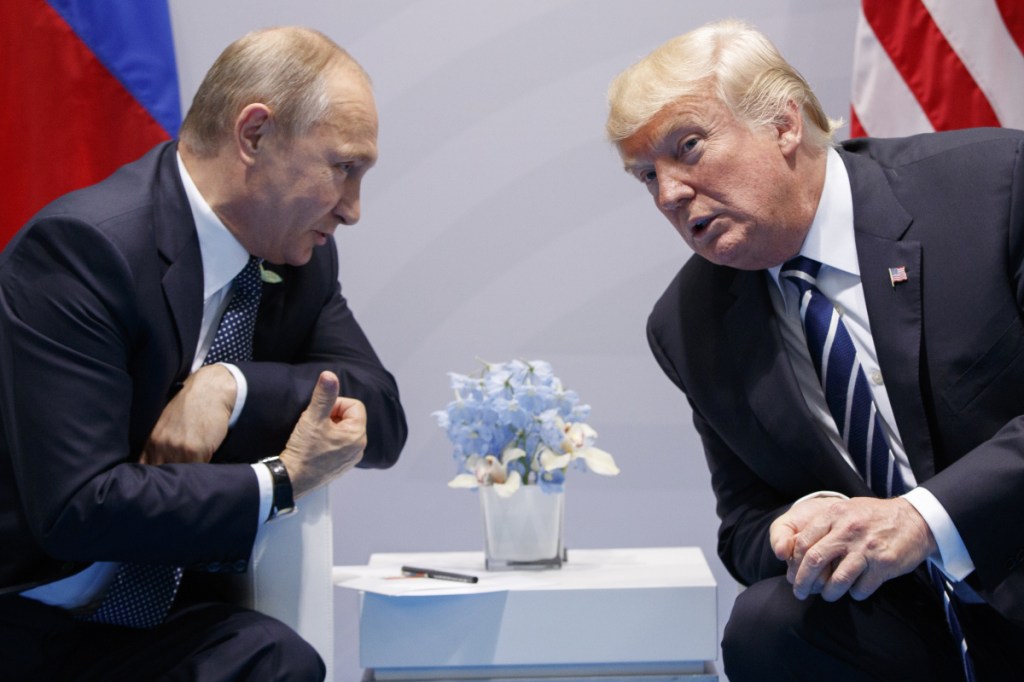President Donald Trump’s submissive behavior toward Russian President Vladimir Putin at a press conference this week, and his persistent refusal to accept his own government’s conclusions about Russian meddling in U.S. elections, has pushed to the forefront a question that had been consigned to the fringes: Has the president committed treason? Several Bloomberg Opinion columnists convened online recently to address a slightly different question: What purpose is served by calling the president treasonous?
Jonathan Bernstein: It’s not a word I use. But I don’t necessarily think it’s out of bounds.
As a question of public relations, I’d say that on the one hand it’s important for Trump opponents to make clear how unusual his actions are and how serious the charges are against him … on the other hand, making over-the-top accusations isn’t great. It’s a fine line there.
And as an observer, I’d say that it’s not unusual at all for opponents of any president to go overboard. Ronald Reagan was a warmonger and a moron, Bill Clinton a liar and a crook, George W. Bush a war criminal, Barack Obama wasn’t even a citizen, and so on. Given that Trump in fact is such a terrible president and (among other things) breaks with consensus on U.S. foreign policy so often while refusing to accept what the intelligence agencies tell him, it’s not surprising we get over-the-top rhetoric – whether it’s a good idea or not.
Noah Feldman: I would reserve the constitutional term “treason” for the situation described in the Constitution: aid and comfort to enemies in war, proved by two witnesses or confession in open court.
Eli Lake: It’s understandable when average Americans watching Trump in Helsinki wonder whether Putin has something on him. It’s quite another thing when the former director of the CIA asks that question, as John Brennan has been doing for the last few days. If Brennan has evidence that Trump is being blackmailed, he should share this information with the Justice Department and congressional leadership. If he and others are just engaging in partisan hyperbole, then they need a time out.
We will learn from Robert Mueller soon enough whether Trump colluded with Russia in the 2016 election. So far, we don’t know that. My hunch is that Trump is impervious to shame and blackmail. Despite the disgrace in Helsinki, Trump has appointed Russia hawks at the highest levels of his government. The Trump administration’s policies toward Russia have been fairly tough – from arms sales to Ukraine to the closure of Russian consulates and expulsion of Russian spies.
If Putin now feels that Trump has given him permission to continue Russian predations against U.S. allies, that is bad enough. It is not necessary to speculate that Trump’s appeasement came because he is a Russian agent. Doing so only normalizes a tactic a future Trumpian opposition will use against the next Democratic president – as Trump himself, with his birther conspiracies, did against the last Democratic president.
Ramesh Ponnuru: Fundraising.
Cass Sunstein: Charity and grace are important, and the presidency is owed a great deal of respect. The word “treasonous” is not exactly charitable (and it is technically incorrect, under the Constitution). But it does have one virtue: It signals the gravity of foreign interference in our elections, and the continuing puzzle of Trump’s indifference to it.
Francis Wikinson: I think the purpose served depends on who is doing the calling. The press needs to be shocked out of its lethargy. John Brennan calling him treasonous alerts the press and other institutional players that it’s insufficient to say, “This is not normal.” It is more than that: It is unprecedented and dangerous. Using the word registers that the politics is way beyond abnormal. It is on the far edge of public imagination, so the public imagination needs to stretch.
Politically speaking, the calculus is different. Democrats aren’t necessarily served by using similar language. They can better fulfill their role by calling for hearings into Trump’s curious habit of submission to a hostile foreign power.
Jonathan Bernstein is a Bloomberg Opinion columnist covering politics and policy. He taught political science at the University of Texas at San Antonio and DePauw University and wrote A Plain Blog About Politics.
Noah Feldman is a Bloomberg Opinion columnist. He is a professor of law at Harvard University and was a clerk to U.S. Supreme Court Justice David Souter. His books include “The Three Lives of James Madison: Genius, Partisan, President.”
Eli Lake is a Bloomberg Opinion columnist covering national security and foreign policy. He was the senior national security correspondent for the Daily Beast, and covered national security and intelligence for the Washington Times, the New York Sun and UPI.
Ramesh Ponnuru is a Bloomberg Opinion columnist. He is a senior editor at National Review, visiting fellow at the American Enterprise Institute and contributor to CBS News.
Cass R. Sunstein is a Bloomberg Opinion columnist. He is the author of “The Cost-Benefit Revolution” and co-author of “Nudge: Improving Decisions About Health, Wealth and Happiness.”
Francis Wilkinson writes editorials on politics and U.S. domestic policy for Bloomberg Opinion. He was executive editor of the Week. He was previously a writer for Rolling Stone, a communications consultant and a political media strategist.
2018 Bloomberg News
Visit Bloomberg News at www.bloomberg.com
Distributed by Tribune Content Agency, LLC.
Send questions/comments to the editors.



Success. Please wait for the page to reload. If the page does not reload within 5 seconds, please refresh the page.
Enter your email and password to access comments.
Hi, to comment on stories you must . This profile is in addition to your subscription and website login.
Already have a commenting profile? .
Invalid username/password.
Please check your email to confirm and complete your registration.
Only subscribers are eligible to post comments. Please subscribe or login first for digital access. Here’s why.
Use the form below to reset your password. When you've submitted your account email, we will send an email with a reset code.